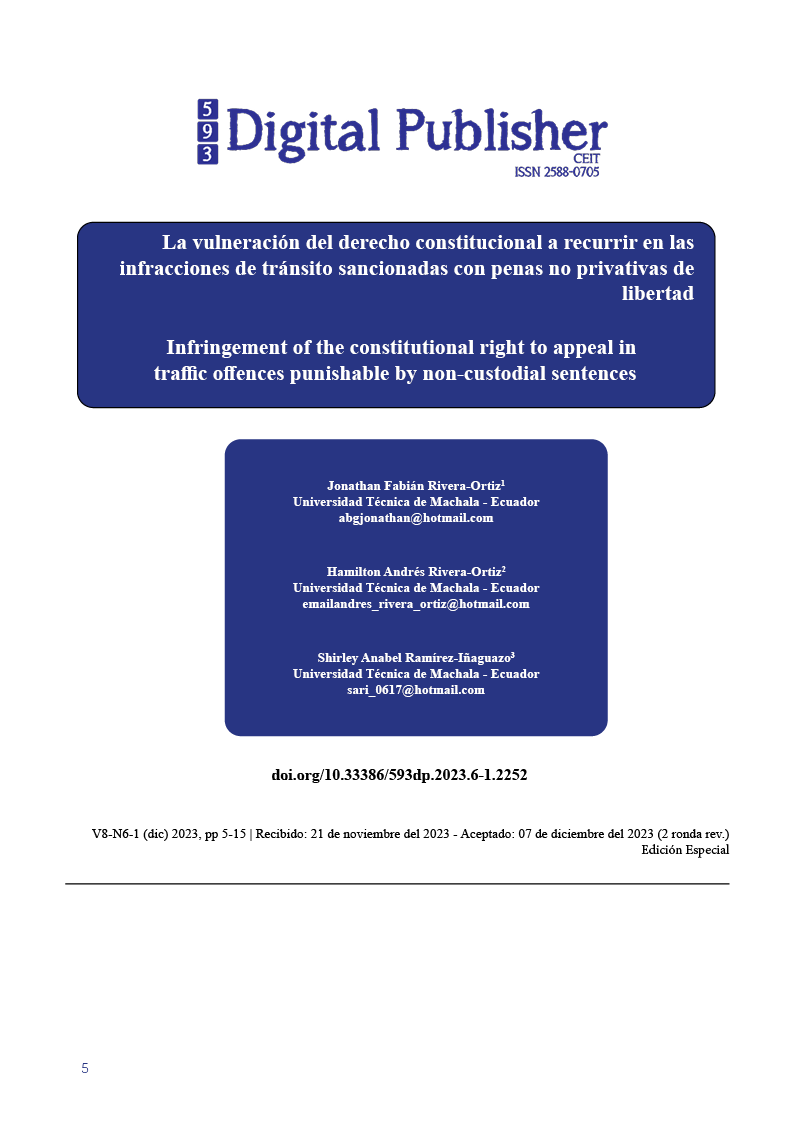Infringement of the constitutional right to appeal in traffic offences punishable by non-custodial sentences
Main Article Content
Abstract
This research work was carried out in search of the violation of the right to due process in the guarantee of recourse to judgment or resolution in traffic violations punished by non- custodial sentences, taking into account that this impossibility of exercising the right to appeal flagrantly violates the constitutional norm such as international treaties and conventions signed by Ecuador. Through scientific research, the violation of the constitutional right to due process in the guarantee of appeal was demonstrated, using theoretical methods such as inductive and deductive methods that helped to establish the violation of the constitutional right to appeal. This research concluded that the constitutional right to appeal is violated in traffic offences that are punishable by non-custodial sentences.
Downloads
Article Details

This work is licensed under a Creative Commons Attribution-NonCommercial-ShareAlike 4.0 International License.
1. Derechos de autor
Las obras que se publican en 593 Digital Publisher CEIT están sujetas a los siguientes términos:
1.1. 593 Digital Publisher CEIT, conserva los derechos patrimoniales (copyright) de las obras publicadas, favorece y permite la reutilización de las mismas bajo la licencia Licencia Creative Commons 4.0 de Reconocimiento-NoComercial-CompartirIgual 4.0, por lo cual se pueden copiar, usar, difundir, transmitir y exponer públicamente, siempre que:
1.1.a. Se cite la autoría y fuente original de su publicación (revista, editorial, URL).
1.1.b. No se usen para fines comerciales u onerosos.
1.1.c. Se mencione la existencia y especificaciones de esta licencia de uso.
References
Asamblea General de Estados Americanos. (22 de Noviembre de 1969). Convención Americana de Derechos Humanos. Secretaría De Los Estados Americanos: https://www.oas.org/dil/esp/tratados_b- 32_convencion_americana_sobre_derechos_humanos.htm
Asamblea General de la Naciones Unidas, O. (10 de Diciembre de 1948). Declaración Universal de los Derechos Humanos. Organización de Naciones Unidas: https://www.un.org/es/universal-declaration-human-rights/
Comisión Interamericana de Derechos Humanos, N. C. (1948). Declaración Americana de los Derechos y Deberes del Hombre. Comisión Interamericana de Derechos Humanos: http://www.oas.org/es/cidh/mandato/Basicos/declaracion.asp
Cornejo, J. (2019). Derecho a Recurrir en el procedimiento abreviado. Derecho Ecuador, 2. Cruz, O. (2015). Defensa a la defensa y Abogacía en México. México: UNAM.
Dávila Álvarez, J. (2019). El Recurso de Apelación en materia procesal penal frente a la doble conformidad. Guayaquil: Repositorio UCSG. http://192.188.52.94:8080/bitstream/3317/14034/1/T-UCSG-POS-MDDP-24.pdf
García Arteaga, I. (2016). Repositorio Universidad de las Américas. http://dspace.udla.edu.ec/bitstream/33000/6169/1/UDLA-EC-TAB-2016-52.pdf
García Cabrera, G. (2020). El derecho a recurrir. Acento, 1.
García, A. I. (2012). Realidad Jurídica y Penal de Suramérica. Bogotà: Temis. Gonzaíni, O. A. (2004). El Debido Proceso. Santa Fe: Rubinzal Culzoni.
Gordillo, G. D. (2015). Manual Teórico Práctico de Derecho Constitucional. Bogotá: COOPS.
Hernández Caro, L. (2020). Doble instancia y doble conforme : antecedentes y estado actual en el derecho procesal penal colombiano y países latinoamericanos. Medellin: EAFIT Repositorio. https://repository.eafit.edu.co/handle/10784/17039
Iberley Colex. (2020). Recursos Penales. Iberley, 1.
Maier, J. B. (2004). Derecho Procesal Penal. Buenos Aires: Editores del Puerto.
Mendoza, N. (2016). La Tutela Judicial Efectiva y el Debido Proceso. Quevedo: Repositorio Uniandes.
ONU, O. d. (16 de Diciembre de 1966). Pacto Internacional de Derechos Civiles y Políticos. Oficina del Alto Comisionado de las Naciones Unidas de Derechos Humanos: https://www.ohchr.org/sp/professionalinterest/pages/ccpr.aspx
Ramirez, J. M. (2010). Medios de Impugnación. Barcelona: Universidad de Barcelona.
Saltos Andrade, A. (08 de Septiembre de 2017). Repositorio Universidad Católica de Santiago de Guayaquil. http://repositorio.ucsg.edu.ec/bitstream/3317/8714/1/T- UCSG-POS-MDC-87.pdf
Tiezzi, F. (2017). Doble conforme: La Garantía del imputado. Argumentos, 1. http://revistaargumentos.justiciacordoba.gob.ar/index.php/primera/article/view/81/5 9
Torres, J., & Cornejo, S. (2018). El principio de doble conforme desde la perspectiva regional. El Peruano Jurídica, 2.




